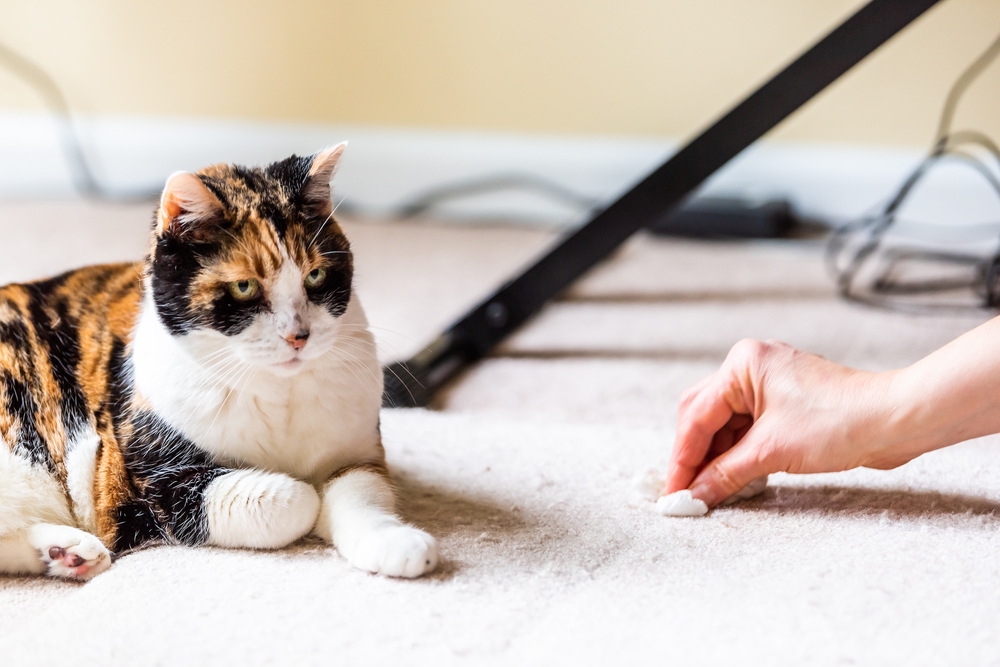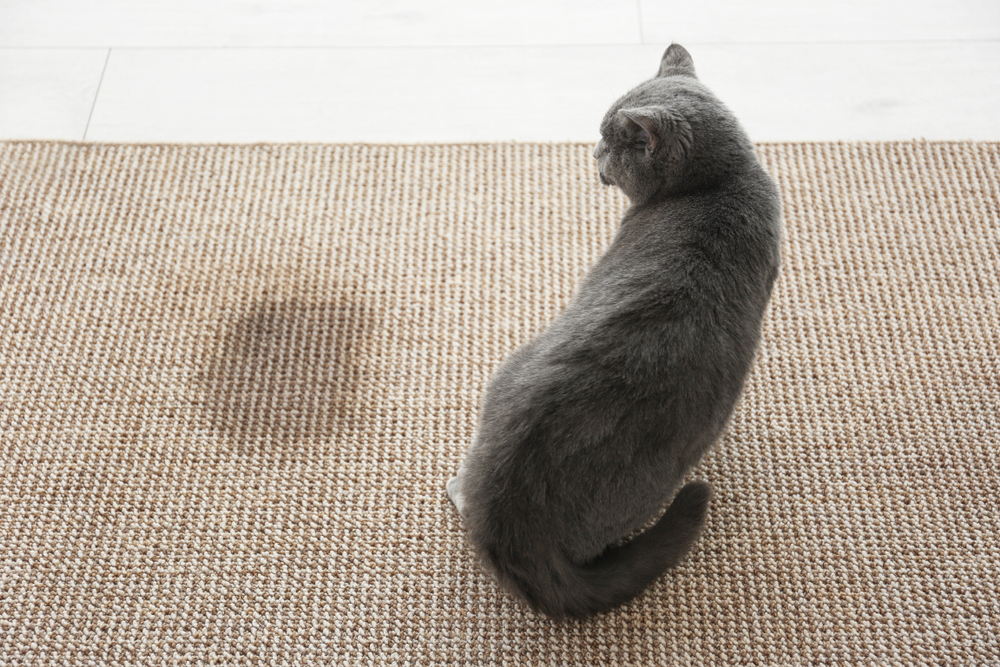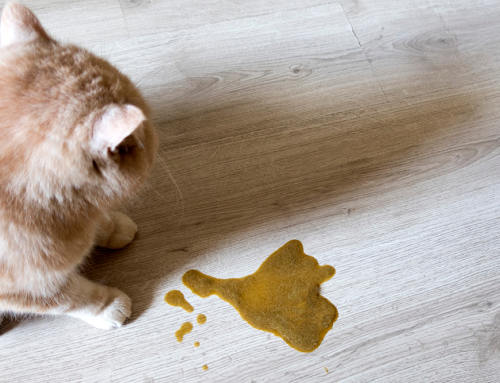Is your cat refusing to use their litter box? Inappropriate urination is an extremely frustrating problem for cat owners, and determining the underlying problem is important to stop this unwanted behavior. Our Wellness Animal Hospital team wants to help—we explain reasons why cats pee outside their litter box and ways to address these issues.
#1: Medical issues can cause your cat to urinate inappropriately
Any health complication can cause a cat to exhibit behavioral changes such as peeing outside their litter box. If your cat suddenly starts urinating inappropriately, you should first contact your veterinarian. Medical issues that may be to blame include:
- Crystalluria — Crystals can form in a cat with abnormal urine pH, and these crystals can cause bladder wall inflammation and potentially lead to bladder infection or bladder stones.
- Urinary tract infection (UTI) — Bacteria overgrowth in the cat’s urinary tract can cause pain and inflammation. Signs include straining to urinate, urinating small amounts frequently, and observing blood in the urine.
- Feline idiopathic cystitis (FIC) — FIC affects the cat’s lower urinary tract and is diagnosed when no underlying cause can be determined. FIC appears to be closely linked to stress, and defects in the bladder lining may also play a role.
- Metabolic disease — Metabolic diseases, such as hyperthyroidism and diabetes mellitus, cause increased thirst and urination.
- Kidney disease — Chronic, progressive kidney deterioration can occur, especially in older cats. Signs include increased thirst and urination, decreased appetite, vomiting, and weight loss.
- Cognitive dysfunction — Cats who develop a condition similar to Alzheimer’s disease in humans may forget to use their litter box.
- Arthritis — Your cat may avoid their litter box because joint pain and inflammation make getting in and out of the box too difficult. Pain medications and joint supplements can help address this problem.
#2: Stress can cause your cat to urinate inappropriately
Any situation that makes your cat stressed or anxious can cause peeing outside the litter box. A stressed cat may urinate in a particular area because smelling their own urine makes them feel safer. Circumstances that may cause your cat to urinate inappropriately include:
- Environmental changes — Any change in your cat’s environment, including moving to a new house, construction in your home, and new house guests, can cause stress in your cat.
- Multiple pets — Inappropriate elimination occurs more frequently in multi-pet homes. Because your cat feels stressed or bullied by other household pets, they may pee outside the litter box.
- Outdoor animals — Other cats or wild animals lingering in your yard may stress your cat and result in inappropriate urination.
- Boredom — Cats who are not sufficiently mentally and physically stimulated can become bored and start urinating outside the litter box. Ensure you provide exercise, vertical space, and cat scratchers to properly enrich your cat.
#3: Litter box aversion can cause your cat to urinate inappropriately
If your cat is displeased with their litter box setup, they may pee outside the litter box. Factors to consider include:
- Cleanliness — Cats are extremely clean animals, and may refuse to use their litter box if the box isn’t cleaned to their standards. Scoop your cat’s litter box at least twice a day, and completely clean the box and change out the litter at least once a week.
- Location — Cats prefer a quiet, secluded area to do their business. If their box is placed where they can be interrupted or startled, they may find somewhere else to use as their bathroom. In addition, if your home has multiple levels, ensure your cat can access a litter box on every level.
- Quantity — If you have multiple cats, ensure you have enough litter boxes. You should have one box for each cat, plus one extra box .
- Size — The litter box should be large enough that your cat feels comfortable when using the box. Generally, the box should be as long as your cat from their nose to the tip of their outstretched tail, and as wide as your cat from their nose to the base of their tail.
- Litter — Most cats prefer unscented, clumpable litter, and you may have to try a few different types to determine your cat’s preference. In addition, cats can be deterred by too much litter in the box. You should fill the box with no more than two to three inches of litter.
- Accessories — Litter box hoods and litter box liners make cleanup easier, but many cats don’t appreciate these litter box accessories.
#4: Attraction to old urine smells can cause your cat to urinate inappropriately

If your cat pees in an area that isn’t cleaned appropriately, they may be attracted to the location and continue to pee there. Steps to properly clean cat urine include:
- Blotting the spot — Use an old towel to absorb as much urine as possible.
- Applying an enzyme cleaner — Enzyme cleaners break down the uric acid to remove the smell. Let an enzyme cleaner sit for a few hours. Avoid ammonia-based cleaners, since ammonia is a cat urine component and will attract your cat to urinate in the area.
- Blocking access — Keep your cat out of the room until the enzymatic cleaner is dry.
Identifying why your cat is eliminating inappropriately is key to stopping the behavior. If your cat is peeing outside the litter box, contact our Wellness Animal Hospital team, so we can ensure a medical problem isn’t to blame.







Leave A Comment